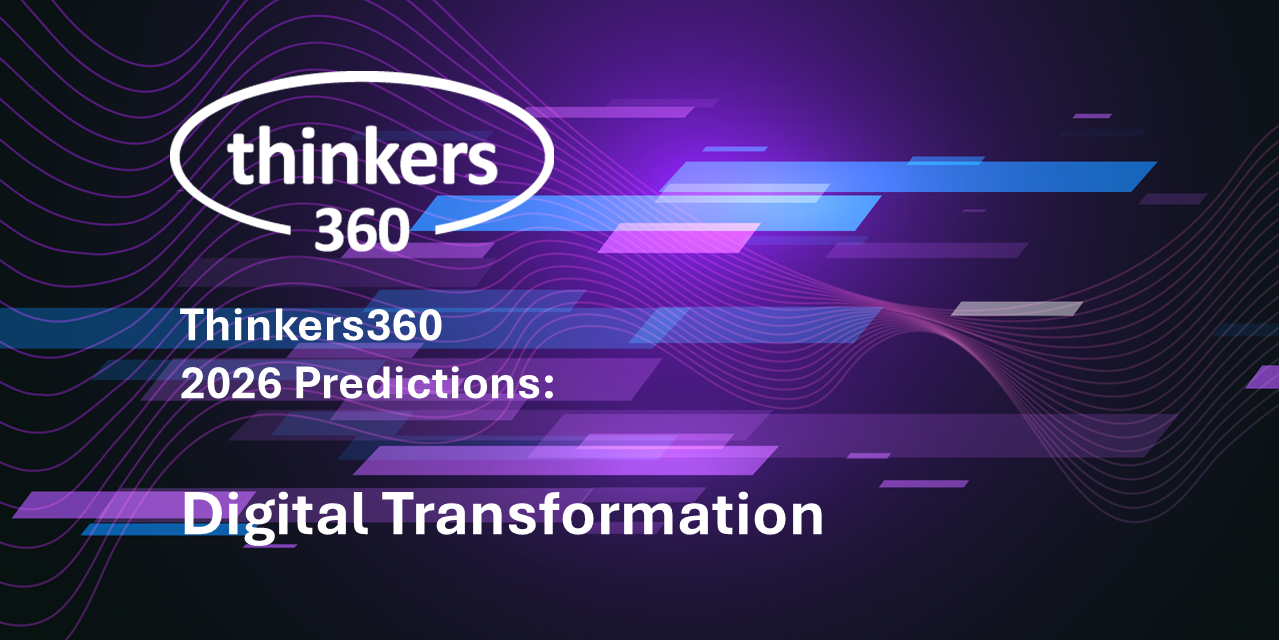2026 Predictions for Digital Transformation
Thinkers360 2026 Predictions for Digital Transformation are member-sourced from our opt-in B2B thought leader, analyst and influencer community with 100M+ followers on social media combined. The 2026 Predictions for Digital Transformation are part of a series to provide actionable insights for business and technology executives.
Brands, Organizations & Startups: Sign up to find and work with advisors, analysts, authors, influencers and speakers in your niche and to amplify your own executives, thought leaders, and content among our opt-in B2B decision maker, analyst and influencer community with 100M+ followers on social media combined! We specialize in B2B thought leadership marketing, B2B influencer marketing, B2B strategic marketing, and B2B analyst and influencer relations putting your brand in front of active B2B buyers, analysts and influencers worldwide. Our enterprise clients average 10X ROI on amplification! – Explore membership today!
Thought Leaders, Analysts & Influencers: To join the world’s largest opt-in B2B thought leader community and influencer marketplace, participate in our thought leadership leaderboards, earn our world-renowned digital award badges and credentials, blog on the #1 thought leadership blog on the Web, and build, amplify and monetize your professional brand – Sign-up today!
Readers & Writers: To contribute your own content and to browse amazing content – including articles/blogs, books, interviews, podcasts and videos, from our opt-in B2B thought leader, analyst and influencer community – Join Thinkers360 today!
We asked a selection of Thinkers360 global thought leaders, analysts and influencers about their predictions for Digital Transformation in 2026.
💡 2026 Digital Transformation Forecast: The Narrative of Change
The year 2026 marks a decisive turn in Digital Transformation, moving beyond simple technology adoption toward a fundamental redesign of enterprise operations, heavily leveraging AI and driven by a shift in culture and focus on business value. Our leading Thinkers360 influencers predict an urgent, holistic transformation.
Key Insights from Industry Thought Leaders
Mohib Yousufani anticipates a crucial need to address Process Debt, viewing transformation holistically to re-architect digital value chains rather than treating it as a series of disconnected tech upgrades. Organizations must streamline architectures and redesign processes for measurable outcomes.
Helen Yu foresees a new intimacy in Human-Machine Collaboration, where AI becomes a genuine thought partner. This shift is coupled with a massive scale-up of advanced Robotics (including humanoid and surgical) and the transition of Quantum Computing into practical, real-world applications for risk modeling and drug discovery.
For Michael Krigsman, the core of the 2026 agenda is the acknowledgment that AI-driven change is the modern Digital Transformation. Business leaders must retain a laser-like focus on business value, rethinking processes and relationships in light of new AI capabilities.
Highlighting a necessary course correction, M. Nadia Vincent, MBA predicts a critical movement toward AI transformation correction. After years of trend-driven adoption, organizations will need to rescue and realign their initiatives to restore efficiency, gain employee trust, and unlock the true business ROI of AI.
Michael Gale dramatically characterizes the change as a leap from the logical ‘digital’ progression to the “Agentic” age—a jet power versus a horse. He stresses that enterprises must seize this existential opportunity by placing their AI and data within a sovereign engine by 2026, or face being left sorely behind.
Zhanna Zhuravleva argues for a Culture-First Digital Transformation, urging leaders to retire the “new house on old foundations” approach. She believes true change begins with a cultural reset, clarifying purpose and upgrading decision rights before re-architecting platforms.
Shifting decision-making itself, Saby Waraich predicts that Digital Twins for Decision Making will move from pilot to mainstream. These virtual replicas, powered by real-time data and AI, will enable organizations to anticipate and model the impact of strategic decisions with data-backed confidence.
Finally, Kamales Lardi describes the evolution of transformation into an operating system via AI-Powered Business Orchestration. Driven by LLMs and predictive analytics, these systems will manage workflows across the organization, enabling “self-adjusting enterprises” that dynamically optimize and continuously transform.
Read on to explore our expert panelists’ opinions in depth and join us on Thinkers360.com to be part of the conversation!
What are your Predictions for Digital Transformation in 2026?
Erasing Process Debt: Paving the Way for a More Agile, Connected Digital Value Chain
In 2026, we’ll see digital value transformation become fully embedded across industries. It won’t just be a technological initiative, but the backbone of how companies operate and deliver value. The organizations that succeed will be the ones that stop treating transformation as a series of disconnected tech upgrades and instead take a holistic view—re-architecting their value chains through cloud applications and modern platforms to drive measurable outcomes for customers and employees alike.
One of the biggest shifts the industry should expect in 2026 is a redefinition of technical and process debt. For years, companies have focused on modernizing legacy systems, but many have overlooked the deeper inefficiencies in how work actually gets done. Process debt, the buildup of outdated, fragmented, and customer-disconnected ways of operating, can be just as limiting as aging technology. True digital transformation will require addressing both.
The organizations that rise to the top will be the ones that streamline architectures, redesign end-to-end processes around clear business outcomes, and reimagine how humans and AI collaborate to deliver value. These companies will not only achieve measurable efficiency gains but also build the agility, scalability, and resilience needed to thrive in an increasingly dynamic digital landscape.
– Mohib Yousufani, PwC US Growth and Business Model Reinvention Leader
In 2026, human-machine collaboration reaches new intimacy as AI systems become genuine thought partners rather than mere tools. Robotics achieves breakthrough dexterity, with humanoid robots entering warehouses and manufacturing at scale, while surgical robots perform increasingly complex procedures autonomously. Quantum computing transitions from laboratory curiosity to practical application, with financial institutions using quantum algorithms for risk modeling and pharmaceutical companies accelerating drug discovery. The boundary between digital and physical worlds blurs further through advanced AR interfaces, enabling remote experts to guide on-site workers in real-time. Organizations that master orchestrating human creativity with machine precision gain decisive competitive advantages, while workforce adaptation becomes the defining challenge.
– Helen Yu, CEO of Tigon Advisory, Host of CXO Spice
AI-driven change is the modern digital transformation
The core of digital transformation in 2026 and beyond lies in rethinking business value, processes, and relationships in light of AI. As technology evolves, business leaders must retain a clear focus on the value their organizations provide to all stakeholders. Successful business operators will embrace the new opportunities enabled by AI, while keeping a laser-like focus on the levers that drive success for customers, employees, and the bottom line. The future of digital transformation, therefore, is leveraging AI to enhance customer relationships, redefine job roles, and streamline processes.
Transformation is complex but inevitable; so, embrace it and leap forward!
– Michael Krigsman, Industry Analyst, CXOTalk
In 2026, we will witness a defining shift in artificial intelligence adoption strategy. After years of trend-driven adoption, many organizations will face the urgent need to rescue and realign their AI initiatives with a true digital transformation leadership framework. The focus will move from AI adoption to AI transformation correction, restoring efficiency, gaining employee trust, and unlocking the business ROI that digital transformation with AI was meant to deliver.– M. Nadia Vincent, MBA, Digital Transformation, AI and Innovation Executive Advisor, Digital Transformation Leaders
Eight years after publishing the Wall Street Journal best-selling book on digital transformation, The Digital Helix, I would have to say we got it badly wrong. Back then, digital was like giving horses to a world that was still walking, still operating in binaries. But today, digital transformation has become fully agentic. It’s jet propulsion compared to horsepower.
The organizations that figure this out aren’t just getting incremental gains. The winners are seeing 5x the ROI, are running 2x the number of AI use cases in mainstream, and those who do it in a sovereign way are securing at least a two-year advantage over their peers. If digital transformation was a logical progression everyone eventually reached, the agentic age will be a massive leap that only a few will survive, because only a few recognize the existential opportunity.
2026 will be the year enterprises either embrace this shift, unifying their AI and their data into one sovereign engine, or face a very real risk of being left far behind.
– Michael Gale, WSJ Best Selling Author on Digital Transformation
Culture-First Digital Transformation
In 2026, the “new house on old foundations” approach to digital change will be retired. Leaders will recognise that real transformation begins with a cultural reset—clarified purpose, upgraded decision rights, and new behaviours that make change stick. Next-gen methodologies will braid digitisation and culture work into a single cadence of value creation, aligning metrics and decision-making around what truly matters. Measures of success will shift from go-live dates and budget conformance to realised value: adoption, cycle time, resilience, and talent energy. Organisations that re-architect norms before platforms will compress delivery, cut waste, and build systems that learn and improve by design.
– Zhanna Zhuravleva, Chartered FCIPD, Tealsen
Digital Twins for Decision Making
Digital twins of organizations will move from pilot to mainstream adoption in both the public and private sectors. These virtual replicas that are powered by real-time data, AI, and simulation will allow leaders to model the impact of strategic, financial, and operational decisions before acting in the real world. In government and education, these Digital Twins will guide infrastructure planning, workforce allocation, and student success strategies. In enterprises, they’ll integrate supply chain, cybersecurity, and sustainability analytics into one adaptive system. The result: organizations will stop reacting to change and start anticipating outcomes with data-backed confidence.
–Saby Waraich, PMSTAC
AI-Powered Business Orchestration
By 2026, enterprises will move beyond isolated automation and adopt AI-powered orchestration layers that manage workflows, data, and decision-making across entire organizations. These orchestration systems, driven by large language models, predictive analytics, and real-time data pipelines will, enable “self-adjusting enterprises” that dynamically reallocate resources, optimize customer engagement, and detect inefficiencies autonomously. This evolution will mark a shift from digital transformation as a project to AI-enabled continuous transformation as an operating system.
– Kamales Lardi, Lardi & Partner Consulting
To see the full set of predictions in the Thinkers360 Predictions Series, please visit our Predictions page. Have comments on these predictions, or predictions of your own? Please join the community at Thinkers360.com and follow us on LinkedIn, X and YouTube to share your insights!
###
Don’t Just Read Thought Leadership—Be the Thought Leader.
This Expert Panel is just a glimpse of the powerful connections and visibility Thinkers360 enables.
###












